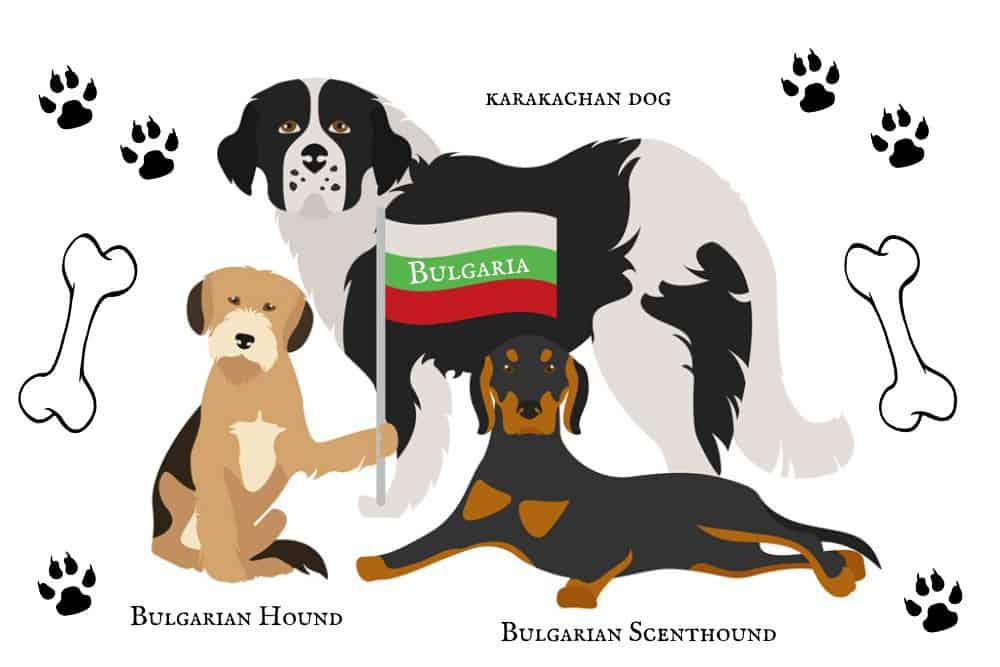Though Bulgaria has a large population of over 7 million people, the number of Bulgarian dog breeds that originate there is small.
From what is known, there are three Bulgarian dogs native of Bulgaria. Included within these are the Bulgarian hound, the Bulgarian Scenthound, and the Karakachan.
Today we will talk a little more in-depth about each of these breeds, discussing common questions like:
- What are the highlights of the breed?
- What interesting facts surround the breed?
- What is the breed temperament?
- What does an overview of the breed look like?
- What are some commonly asked questions about the breed?
So let’s not waste another minute:
1. BULGARIAN HOUND (Български барак, барак куче,)
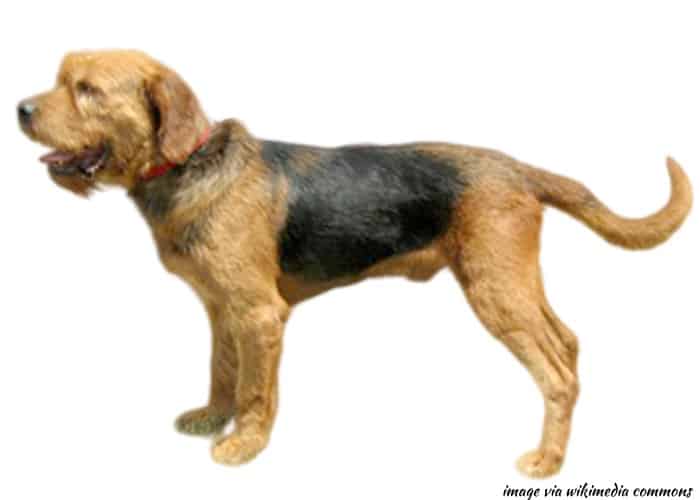
Highlights: Independent, Freethinking, Forms strong bonds
The Bulgarian Hound, sometimes referred to as the Bulgarian Barak or is an ancient breed of dog that has long been used for their impressive scent tracking abilities.
The history of the breed dates back thousands of years, but because no records were kept at the time, the exact origins are still unknown.[1]
Some theories suggest that the Turks brought the breed over from Asia during their invasion of Europe, while others claim that the Ancient Thracians bred the Bulgarian Hounds.
Though the exact origins of the breed are still unknown, what is known is that the modern form of the breed was a result of cross-breeding between local dogs and hunting dogs from around the world.
DID YOU KNOW?
- Not only have the Bulgarian Hounds been long used for tracking down prey with their nose, but they have also been known to bring down fearsome wildlife like wild boars.
- In the mountains, Bulgarian Hounds often operate alone, tracking prey far ahead of their hunter, and then barking to signal that they have found something.
- The word “Barak” comes from the Turkish word meaning “Shaggy” describing the fur coat of the breed.
Temperament:
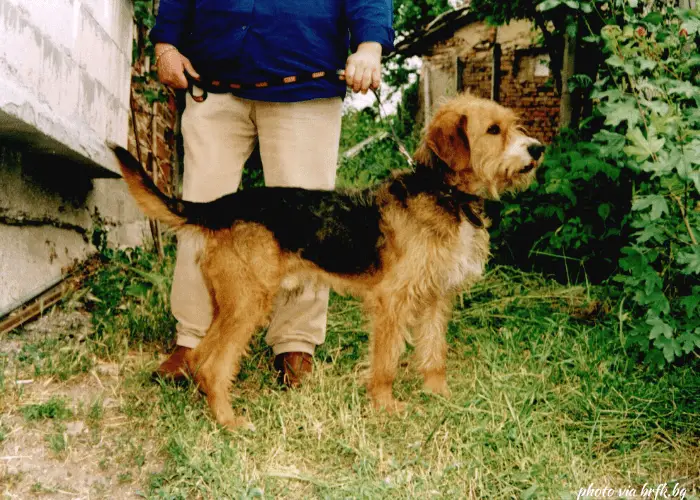
Like most scent tracking dogs, the Bulgarian Hound is strongly bonded with its owner or family, but also tends to be very independent.
Because they often work well ahead of their hunter, they can be independent-minded and freethinking.
This can be a great ability to have for hunting, but when it comes to training, the Bulgarian Hound can be very stubborn and isn’t very good at listening.
As such, training can be difficult, and the Bulgarian Hound requires a strong leader for an owner. They are not suited to new pet owners.
[table id=27 /]
Related Questions:
1. Are Bulgarian Hounds good with other animals?
No. The Bulgarian hound has a strong hunting instinct and cannot tell the difference between a wild rabbit and your pet bunny.
To this breed, other animals are considered prey. Bulgarian hounds need to be kept on a leash when other animals are nearby, and should not be kept with other house pets.
2. Is the Bulgarian Hound Noisy?
Yes. Because the Bulgarian Hound has also long been trained to bark when they seek out prey, they also have a tendency to be noisy and do tend to bark more often than other breeds.
As such, they don’t fare well in apartment situations. The Bulgarian Hound does best in country homes where they have room to roam, and where their bark will not be distracting to others.
3. Will my Bulgarian Hound respond well to puppy classes?
As mentioned above, Bulgarian hounds can are extremely independent and can be very strong-willed.
This breed can be very difficult to train and is easily distracted by other things. Unlike most breeds of dog that will fare well from obedience classes, it’s unlikely that the Bulgarian hound will.
Sitting still and obeying commands isn’t really the Bulgarian Hounds thing. Instead, they respond better to outdoor training where they can learn to do things like fetch and retrieve.
Check Out dogs from Other European Countries below:
2. BULGARIAN SCENTHOUND (Balgarsko Gonche)
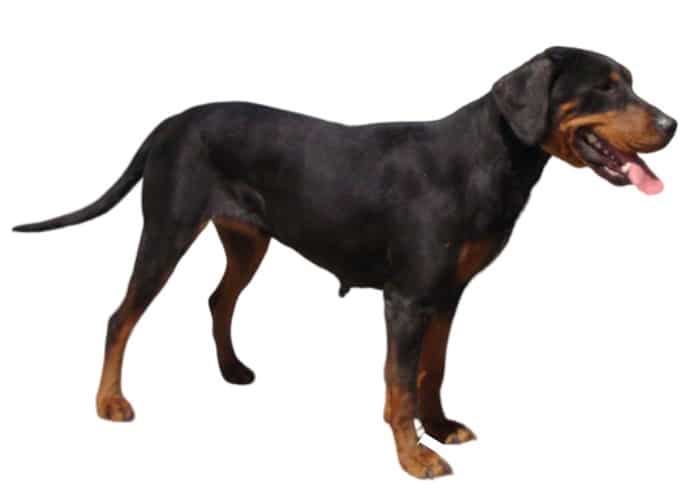
Highlights: Good-natured, Intelligent, Highly trainable
The Bulgarian Scenthound, though very similar in name to the Bulgarian hound, boasts quite a different appearance.
While the Bulgarian hound has a very wiry coat of fur, the Bulgarian scenthound is more smooth-coated and is often said to resemble a Doberman or Rottweiler.
As an older breed, the exact origins of the Bulgarian Scenthound are unknown.
Several theorists suggest that the Bulgarian Scenthound is a mixture of dogs belonging to the Ancient Thracians combined with those brought over by the Turks from Asia.
Whatever their origins, this breed seemed to have made quite an impact in history, often being recorded in artwork and pottery.
The breed was commonly used for their strong tracking and hunting instincts.
Today they are popular in their native home of Bulgaria but are not very well known throughout the rest of the world.
DID YOU KNOW?
- The Bulgarian Scenthound also goes by the name “Gonche”, which means tracker or pursuer
- In their early working times, Bulgarian Scenthounds had to earn their name by tracking a live hare and driving it back to their owner. If the dog could do this three times, they would successfully earn their name of “Bulgarian Scenthound”.
Temperament:
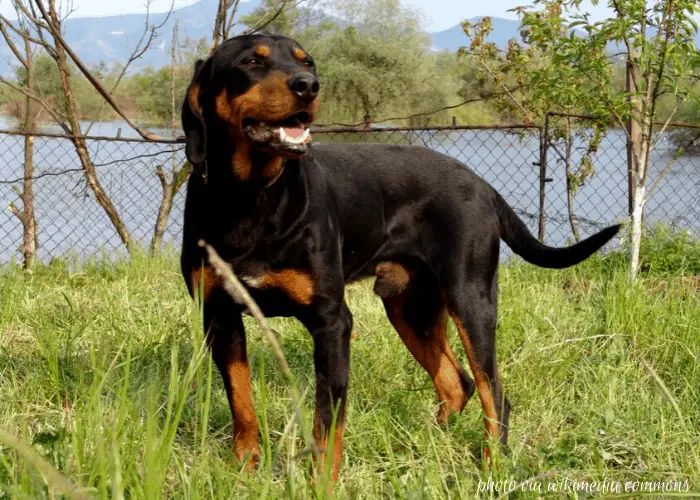
The Bulgarian Scenthound is a working breed of dog that is happiest when they are given a job to do.
The breed tends to bond intensely with family members, though they tend to bond more closely with one specific person.
When properly socialized as a puppy, the Bulgarian Scenthound is extremely well natured and will do well with both strangers and other dogs.
Having said that, if they are not properly socialized when young, they may end up becoming mistrustful and anxious around new people.
[table id=28 /]
Related Questions:
1. Do Bulgarian Scenthounds make good family pets?
Bulgarian Scenthounds can make good family pets, but it seems that they need to be either a family pet or a hunting dog.
Trying to keep the scenthound as a hunting dog and a family pet can become tricky, as their strong prey drive can make living in a home environment difficult for the dog.
If you are considering the Bulgarian Hound as a family pet, you need to raise it as a puppy in that environment.
2. I’ve heard that Bulgarian Hounds can be trained to respond to one person and one person only. Is this true?
Yes, as mentioned above, Bulgarian scenthounds bond intensely with their family members, but tend to bond closer with one particular “master”.
Many hunters train their Bulgarian scenthounds to obey only their commands.
3. Are Bulgarian Scenthounds easy to train?
Yes. Bulgarian Scenthounds are extremely intelligent and highly trainable.
They seek to please their master and tend to bond closely during the training process. Reward-based training methods work best for this breed.
3. KARAKACHAN DOG (Ovcharsko Kuche, Thracian Mollos)
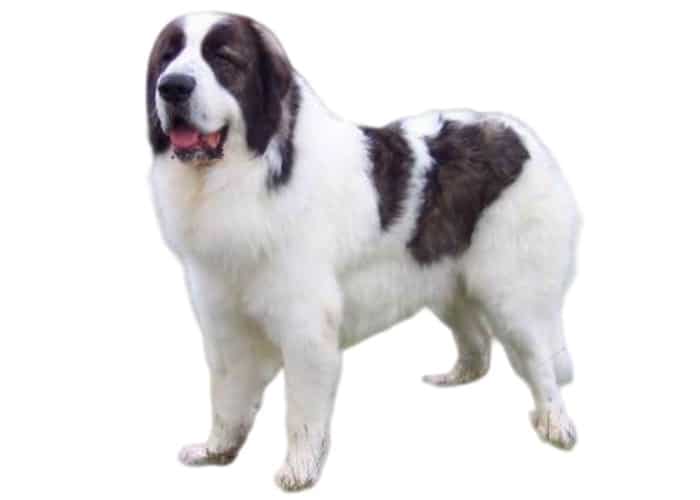
Highlights: Well-tempered, Playful, Patient
The Karakachan dog is a huge breed of dog that has long been used for protecting livestock and warning off potential threats.
The breed, also known as the Bulgarian Shepherd, is extremely rare. Though their origins can be traced back to Bulgaria, their exact ancestry is not well documented.
Many believe, however, that the breed was developed from Central Asian herding dogs.
Because of their massive size, the Karakachan dog has long been used to guard livestock, as well as to guard homes.
While the breed is extremely rare, they have been seen in North America and in their homeland of Bulgaria.
They are not officially accepted into any International Kennel Clubs, but the standard of the breed was set in 2005.
DID YOU KNOW?
- During the 1950s, the ratio of the Karaka Chan dogs was reduced dramatically because of the agricultural plan devised by the government. That plan focused on the production of foreign breeds only so their own species got affected immensely.
- They are legendary in Bulgarian folklore as they can herd 12,000 sheep in one time if are 100 in number.
- US President George .W. Bush in 2003 visited Bulgaria and was gifted with a Karaka Chan dog.
- The Bulgarian Prime Minister Boyko Borisov gave a Karaka Chan dog to the Russian Prime Minister Vladimir Putin in 2010.
Temperament:
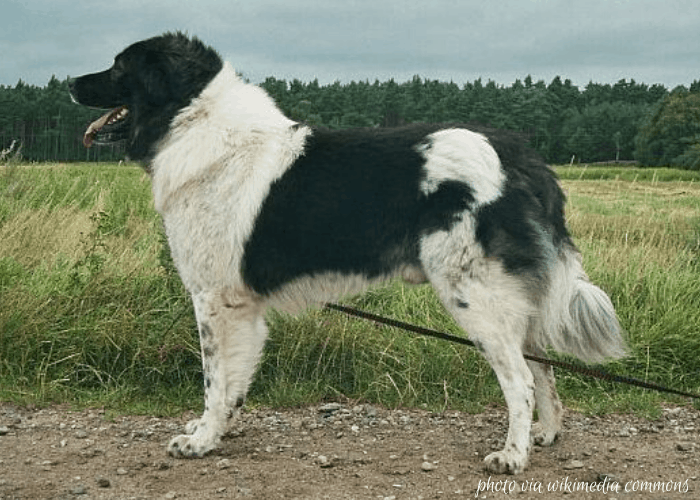
The Karakachan is a working breed of dog that is extremely dedicated to its role.
They are hard-working, courageous, and make excellent guard dogs. If any threat is perceived to their herd, they will respond with aggression.
Having said that, in a home environment, the Karakachan is exceptionally loving, loyal, and protective of their family members.
Though they are considered to be unaggressive in this type of environment, they may attack if provoked. With that said, they will always give a lot of vocal warning before doing so.
Though they are unlikely to be aggressive towards them, Karakachans are naturally wary of strangers and require extensive socialization as puppies to prevent anxiety.
The breed is extremely intelligent and tends to be independent thinkers. For this reason, training can be difficult, and they are best left to experienced handlers.
[table id=29 /]
RELATED QUESTIONS:
1. Are Karakachans safe to be around children?
Yes. The Karakachan tends to bond extremely closely with its family members, including young children.
When raised together, the Karakachan will become very protective of a child and will devote themselves to them.
Having said that, because of their massive size, the breed should always be monitored when small children are near.
Though they would never intentionally cause harm, they could accidentally knock them over.
2. Is the Karakachan easy to train?
Even though Karakachans are extremely intelligent, they are also very independent and strong-willed.
For this reason, they do not always submit to commands, and they can be difficult to train.
For this reason, the Karakachan requires a confident and experienced handler that can establish themselves as the leader of the pack.
Positive reinforcement training methods are the most recommended for this breed.
3. Do Karakachans drool a lot?
Yes, the Karakachan breed does have a tendency to drool quite often.
This will most often occur when they are about to eat, when they are excited, when they are stressed, or when their teeth are growing. Females in heat also tend to drool more than other times.
Conclusion:
In conclusion, though they are limited in numbers, there are some fascinating breeds of dog that originate from Bulgaria.
The main purpose of most of these breeds was to track and hunt prey, or guard livestock.
But whatever their title, one thing is for sure is that all Bulgarian dog breeds are strong, courageous, and brave.
It’s not too late to see more European Dog Breeds below:
REFERENCES: ✍️
1. [^] Mitochondrial Diversity of Bulgarian Native Dogs Suggests Dual Phylogenetic Origin, https://www.ncbi.nlm.nih.gov/pmc/articles/PMC6026455/.

